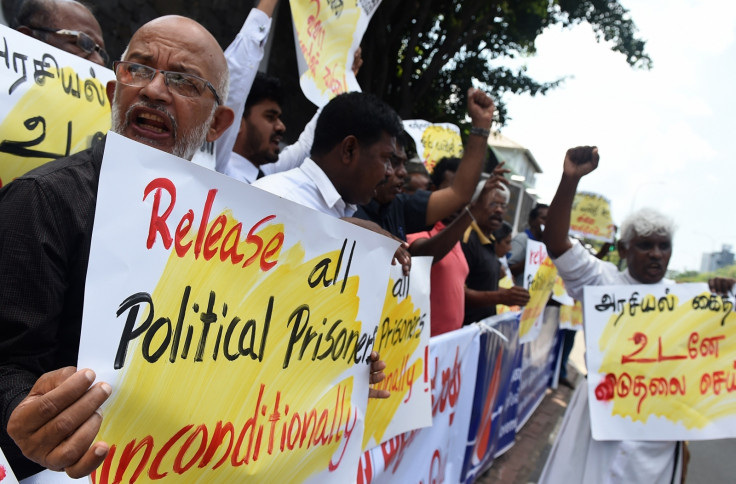Little faith that Sri Lanka will deliver justice for Tamils 'tortured and raped by army and police'
UN Committee Against Torture criticised Sri Lankan government earlier this year for failing to investigate sexual violence and rape.

The Sri Lankan government has promised to investigate allegations of torture and abduction against ethnic Tamils, after 20 men seeking asylum in Europe testified that they were beaten and raped by police and army officials, almost ten years after the civil war ended.
The men's accounts of torture, rape and abduction by Sri Lankan authorities were published by the Associated Press (AP) on Wednesday (8 November). As well as conducting 20 interviews, the news agency reviewed 32 medical and psychological evaluations.
One man told AP that he was held in a room for 21 days, raped 12 times, burned with cigarettes and beaten with iron rods.
Most of the men claim they were abducted, after being accused of belonging to the Tamil Tigers militant organisation, and said they were sexually assaulted or raped during their detention.
South African human rights investigator Piers Pigou told AP that the levels of sexual abuse committed by "Sri Lankan authorities are the most egregious and perverted that I've ever seen."
The Tamil Tigers battled against Sri Lankan forces for decades until their defeat in 2009. The government has said that the group no longer poses a threat.
Sri Lanka's Army Commander Lt. Gen. Mahesh Senanayake denied that the army or police had any involvement in torturing Tamils. "The army was not involved — and as for that matter — I'm sure that police also were not involved," he said. "There's no reason for us to do that now."
Dozens of men say Sri Lankan forces raped and tortured them https://t.co/3KNOH5vMql by @paisleydodds #rbnews #SriLanka #Tamil #nationalism #torture #rape pic.twitter.com/kxemChCcSr
— (((glyko))) (@glykosymoritis) November 9, 2017
In a letter to AP, government officials wrote that they "strongly condemn any act of torture" and vowed that any such allegations would be "investigated and prosecuted to the full extent of the law."
"The government seeks the assistance and cooperation of all those relevant parties in this endeavor including parties outside the country, as evidence is key in the conduct of investigations," said the letter, which was signed by Foreign Affairs Ministry official Prasad Kariyawasam.
But human rights activists are sceptical about the government's commitment to carry out a thorough investigation into the allegations.
Thej Thapa, senior Asia researcher at Human Rights Watch (HRW) told IBTimes UK: "I hope the government response to the latest report indicates a resolve towards fulfilling its pledges under the UN Human Rights Council resolution 30/1 [on promoting reconciliation, accountability and human rights in Sri Lanka]. Unfortunately we have seen little progress on either this or other pledges under the resolution."
Charu Hogg, director of the All Survivors Project and Associate Fellow on the Asia Program at Chatham House, told IBTimes UK that Sri Lanka's past record in investigating human rights violations against Tamils "does not inspire confidence."
"Over the past few decades, the Sri Lankan government has initiated a litany of probes and inquiries into charges of human rights violations, however few have reached convictions," she said. "In January 2017, the UN Committee Against Torture criticised the Sri Lankan government for failing to provide updated information on the progress of investigations relating to sexual violence and rape."
"In Sri Lanka, a wholly inadequate legal framework limits protection available to men and boys and undermines efforts to hold perpetrators to account. For example, Sri Lankan law does not recognise and therefore does not proscribe male rape," Hogg said. "Added to this discrimination, the criminalisation of consensual same-sex acts may further discourage male survivors from reporting or accessing services."























